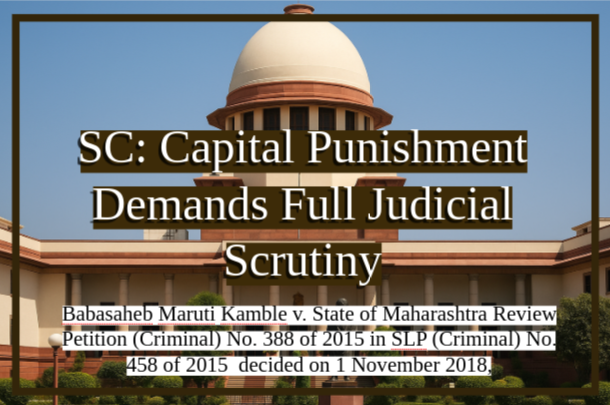Custodial Torture: SC Ruling Orders CBI Probe, Quashes FIR, and Awards ₹50 Lakh Compensation
- M.R Mishra

- Jul 23, 2025
- 3 min read
In a searing indictment of institutional apathy and police brutality, the Supreme Court of India has delivered a significant judgment (Khursheed Ahmad Chohan v. U.T. of J&K & Ors., July 21, 2025) that reaffirms the inviolability of human dignity against state excesses.
The case, involving the horrific custodial torture and genital mutilation of a serving Jammu & Kashmir police constable, culminated in the Court exercising its extraordinary powers under Article 142 to order a CBI investigation, quash a malicious counter-FIR, and award unprecedented interim compensation of ₹50 lakhs.
What's The Matter?
The facts, meticulously documented by the Court, paint a harrowing picture. Constable Khursheed Ahmad Chohan, summoned for a narcotics inquiry on February 17, 2023, reported to the Joint Interrogation Centre (JIC), Kupwara, on February 20.
What followed was six days of alleged illegal detention and unspeakable torture. Medical records from SKIMS, Soura-Srinagar, presented irrefutable evidence of catastrophic injuries The Discharge Summary detailed extensive surgeries
Instead of registering an FIR on the victim’s wife’s immediate complaint (March 1, 2023), detailing custodial torture, the police apparatus swung into cover-up mode.
They registered FIR No. 32/2023 against Chohan himself under Section 309 IPC (attempted suicide), claiming he cut his veins with a blade in his barracks.
This narrative, the Court found, crumbled under the weight of medical evidence proving such grievous, complex injuries were medically impossible to be self-inflicted within the alleged timeframe (09:00 AM - 11:15 AM on Feb 26), especially without fatal hemorrhage or loss of consciousness.
The High Court’s order for a mere "preliminary inquiry" by the very Senior Superintendent of Police (SSP) who summoned Chohan was deemed a travesty of justice.
The Supreme Court’s Resounding Reaffirmation of Constitutional Safeguards
The Bench, comprising Justices Vikram Nath and Sandeep Mehta, systematically dismantled the State’s defences and laid down crucial legal principles:
Mandatory FIR Registration: No Exception for Custodial Torture: The Court slammed the police and the High Court for ignoring the Constitution Bench mandate in Lalita Kumari v. State of U.P. (2014).
When information discloses a cognizable offence especially heinous ones like custodial torture involving public servants registration of FIR is mandatory and immediate. No preliminary inquiry is permissible.
The medical evidence and the wife’s complaint left no doubt about cognizable offences (Sections 307, 330, 331, 326 IPC, etc.)
The High Court’s direction for an inquiry by the implicated SSP’s superior was a "flagrant violation" of nemo judex in causa sua (no one can be a judge in their own cause) and a "complete misunderstanding" of Lalita Kumari.
Transfer to CBI: Imperative for Impartiality in Institutional Crimes: Citing precedents like Mohd. Anis and R.S. Sodhi, the Court emphasized that transfer to CBI is warranted when the local agency is biased, complicit, or lacks credibility.
This case presented "exceptional circumstances" demanding CBI intervention:
Unprecedented Barbarity: The nature of the torture (genital mutilation) was "one of the most barbaric instances of police atrocity."
Systematic Cover-Up: From illegal detention (evidenced by the temporal gap between summoning and FIR registration) to refusing the victim's complaint and fabricating a suicide theory.
Institutional Bias & Conflict of Interest: The same police machinery accused of torture was investigating NDPS cases against Chohan, creating an "inherent bias" and "vested interest" in suppressing the torture allegations.
Failure of Local Machinery: A "complete institutional failure" at every level. Only an independent CBI probe could "restore public faith" and ensure perpetrators are brought to book.
Quashing Malicious FIRs: A Shield Against State Vendetta: The Court unhesitatingly quashed FIR No. 32/2023 under Section 309 IPC, calling it "prima facie fabricated" and registered with "mala fide intent to shield the guilty officers."
Applying State of Haryana v. Bhajan Lal (1992), the Court held the FIR fell squarely within parameters justifying quashing:
(1) allegations, even if true, disclosed no offence (especially considering Section 115 Mental Healthcare Act, 2017, creating a presumption against prosecuting attempt to suicide); and (7) proceedings were "manifestly attended with mala fide" and "instituted maliciously with an ulterior motive for wreaking vengeance."
The trivial "cut vein" allegation versus the reality of castration exposed the "institutional malice."
Compensation for Egregious Article 21 Violation: A Landmark Quantum: Invoking D.K. Basu, Nilabati Behera, and Sube Singh, the Court held the "patent and incontrovertible" violation of Article 21, "gross and of a magnitude to shock the conscience," warranted substantial compensation.
Awarding ₹50 Lakhs as interim compensation, the Court directed the J&K UT administration to pay Chohan immediately. Crucially, the State is obligated to recover this amount from the officers found guilty after the CBI investigation/concluded departmental proceedings.
This "recovery clause" marks a significant step towards personal accountability.
.
The Supreme Court has not just delivered justice, it has fortified the ramparts protecting every citizen's right to life and dignity against the terrifying spectre of state-sanctioned torture.







Comments